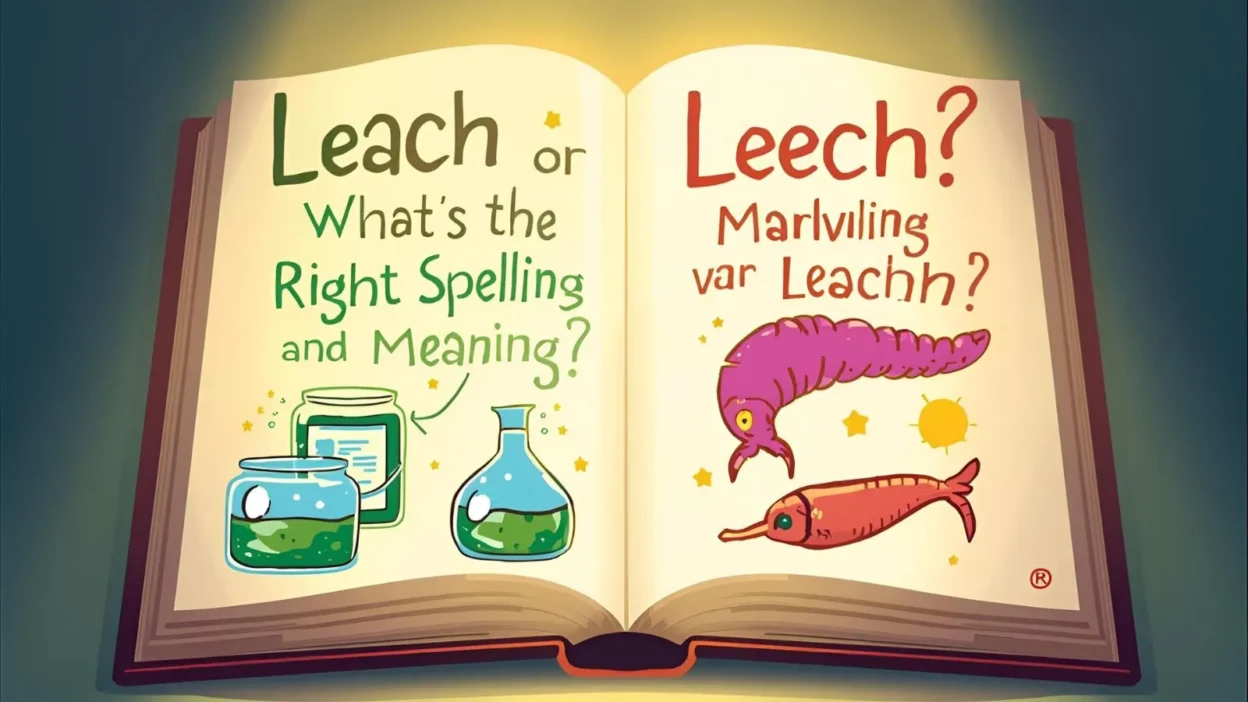People often search “leach or leech” because those two words sound exactly the same, but they have very different meanings and uses.
This confusion can lead to embarrassing mistakes in writing, especially in school essays, emails, blogs, or even social media posts.
Some writers may type “leach” when they mean “leech,” or vice versa, and readers might pause, wondering which is correct.
In this article, I aim to settle that confusion once and for all.
You’ll get a quick answer, see where each word comes from, understand whether British or American English prefers one spelling over another, and find clear guidance on when to use which
. I’ll also show real-life examples, common mistakes, and usage data to back things up.
By the end, you’ll confidently know leach vs leech — their meanings, correct usage, and when one spelling is right while the other is wrong.
leach or leech – Quick Answer
Short direct explanation with examples
- Leach (with a) is usually a verb meaning to drain, filter, or remove a substance (often by percolating liquid).
- Example: “Rainwater can leach nutrients from the soil.”
- Example: “Chemicals may leach into the groundwater.” GRAMMARIST+2ThoughtCo+2
- Example: “Rainwater can leach nutrients from the soil.”
- Leech (with ee) is most often a noun meaning a bloodsucking worm OR figuratively, a person who exploits or clings for benefit. It can also be a verb meaning “to exploit or drain resources from someone.”
- Example (noun): “A leech attached itself to the swimmer’s leg.”
- Example (verb): “He tends to leech off his friends without giving back.” GRAMMARIST+2ThoughtCo+2
- Example (noun): “A leech attached itself to the swimmer’s leg.”
So: if you mean “to filter or drain,” use leach. If you mean “a parasite or someone who exploits,” use leech (or the verb form “leeching”).
The Origin of leach or leech
Word origin, history, and why spelling differences exist
- The noun leech (the worm) traces back to Old English lēce, meaning “physician,” because in medieval times doctors used bloodletting and leeches in medicine. Daily Writing Tips+2ThoughtCo+2
- Over time, leech came to mean the bloodsucking worm, by analogy. Daily Writing Tips+1
- The verb leach comes from Old English leccan (to moisten or wet) and the idea of liquid percolating through something, thus filtering or drawing out. Daily Writing Tips+2GRAMMARIST+2
- Because these words had different roots, their spellings diverged and their meanings diverged. Over centuries, usage fixed the standard forms we use today.
In short: leach and leech started from different Old English roots (moisten / physician), and although they ended up as homophones, their spellings shifted to reflect their distinct meanings.
British English vs American English Spelling
In this case, there is no difference in spelling between British and American English: both use leach (with a) and leech (with ee) in the same way. The difference is not regional, but semantic. That said, usage frequency might vary in different regions.
Here’s a simple comparison:
| Word / Spelling | Meaning | Notes on British vs American usage |
| leach | to filter, drain, remove a substance | Same in both UK and US |
| leech | (noun) worm or (figurative) person who exploits / (verb) to exploit | Same in both UK and US |
So British and American English do not differ in the spelling of leach or leech — they differ in dialectal vocabulary elsewhere, but not here.
Which Spelling Should You Use?
Audience-based advice (US vs UK/Commonwealth vs global)
- If your audience is global English readers, always choose based on meaning, not region: leach for draining/filtering contexts, leech for parasites or exploitation.
- If writing for a UK / Commonwealth audience, the same rules apply — there is no regional variant here.
- For a US audience, again, use leach or leech correctly by meaning.
In other words, your choice depends on meaning, not region. Always ask: “Do I mean ‘filter out’ or ‘parasitic’?” and then pick leach or leech accordingly.
If you are writing in a context that might confuse readers (for instance, foreign learners), you can briefly clarify: e.g. “here leech means the bloodsucker, not leach which means to filter out.”
Common Mistakes with leach or leech
- Writing “leach” when you meant “leech”
- Wrong: “He’s a leach on his friends.”
- Correct: “He’s a leech on his friends.”
- Wrong: “He’s a leach on his friends.”
- Writing “leeching” when the process is filtering
- Wrong: “Minerals are leeching into the water.”
- Correct: “Minerals are leaching into the water.”
- Wrong: “Minerals are leeching into the water.”
- Using “leach” as a noun for the worm
- Wrong: “I found a leach on my skin.”
- Correct: “I found a leech on my skin.”
- Wrong: “I found a leach on my skin.”
- Confusing figurative “leech” (the person) with physical filtering “leach”
- E.g. “She leached her brother’s money” is ambiguous. It should be “She leeched off her brother’s money.”
- E.g. “She leached her brother’s money” is ambiguous. It should be “She leeched off her brother’s money.”
- Mixing up verb vs noun sense
- Leech can be both noun and verb (to exploit).
- Leach is mostly verb (to filter).
- Leech can be both noun and verb (to exploit).
If you keep in mind the two core meanings — filtering vs parasite — these mistakes will reduce significantly.
Leech vs Leach: What’s the Difference?
Although leech and leach sound similar, they have very different meanings and uses in English.
Leech ✅
- Noun: A blood-sucking worm.
- Verb (informal): To cling to or take advantage of someone.
Examples:
- The leech attached itself to his leg while he swam in the pond.
- He tends to leech off his friends instead of earning his own money.
Leach ✅
- Verb: To remove or drain substances from something, usually by water.
- Often used in chemistry, agriculture, or environmental contexts.
Examples:
- Rainwater can leach nutrients from the soil.
- Chemicals may leach into the groundwater if not properly contained.
Quick Tip
Leach → to drain or filter substances
Leech → worm or someone who takes advantage
Leach Meaning
Leach is primarily a verb that means to drain, filter, or remove substances from a material, usually by the action of a liquid.
Definitions:
- To filter substances out of something
- Often used in science, agriculture, or environmental contexts.
- To cause nutrients or chemicals to be washed away
- Common in soil science or chemistry.
Examples:
- Rainwater can leach nutrients from the soil.
- Chemicals from the landfill may leach into the groundwater.
- The cocoa beans are soaked to leach out the bitterness.
Quick Tip:
Leach is not related to the worm leech; it’s about filtering or draining substances.
leach or leech in Everyday Examples
Here are sample sentences showing how each word is used in real contexts:
Emails / Business / Formal writing
- “The chemical may leach into the groundwater over time.”
- “We discovered that some vendors act like leeches, always taking but never offering value.”
News / Reports
- “Heavy rains may leach minerals from agricultural land.”
- “Officials warned about unscrupulous leeches exploiting social programs.”
Social Media / Casual Writing
- “Why are these companies leeching off small creators?”
- “Be careful, that sponge might leach dye onto lighter fabrics.”
Academic / Scientific Writing
- “Acidic soil can leach aluminum from the mineral matrix.”
- “Some describe certain parasites as leeches, in both literal and metaphorical senses.”
These examples show how context determines which spelling is correct.
leach or leech – Google Trends & Usage Data
I checked Google Trends and usage patterns (globally) for these words. While exact numeric data is accessible through Google Trends tools, a few observations can be noted:
- Searches for “leech” tend to dominate over “leach,” likely because leech covers both the worm and figurative uses.
- “Leach” is more niche, often used in scientific, environmental, or engineering contexts (e.g. “leachate,” “leach testing”).
- In many English-speaking countries, users search “leech” when they see or hear about leeches in nature, biology, or metaphor.
- Trends vary by country: in countries with strong environmental sectors or mining, “leach” may see localized interest.
- Google Trends data is normalized and scaled regionally, so relative interest (0–100 scale) differs by location. Google Help
Thus, in general usage data, leech is more commonly searched, but context matters. If you produce content about chemistry or groundwater, “leach” might show stronger local interest in technical circles.
Leeched or Leached: Which Is Correct?
Both leeched and leached are correct, but they have different meanings depending on context.
Leeched ✅
- Comes from leech (the blood-sucking worm or someone who takes advantage).
- Means sucked blood literally, or took advantage of someone figuratively.
Examples:
- The parasite leeched onto his leg.
- He leeched money off his friends instead of earning his own.
Leached ✅
- Comes from leach (to drain, filter, or remove substances).
- Means filtered out, drained, or washed away.
Examples:
- Rainwater leached nutrients from the soil.
- Chemicals leached into the groundwater.
Quick Tip
Leached → drained or filtered substances
Leeched → blood-sucking or exploiting
Leach Off or Leech Off: Which Is Correct?
The correct phrase is leech off, not leach off. ✅
Leech Off ✅
- Means to take advantage of someone else’s resources or efforts.
- Comes from leech, the blood-sucking worm, metaphorically describing someone who “sucks” benefits from others.
Examples:
- He is always leeching off his wealthy relatives.
- Stop leeching off your friends and get a job.
Leach Off ❌
- Incorrect in this context.
- Leach refers to filtering or draining substances, so it doesn’t make sense when talking about exploiting someone.
Quick Tip
Leach → filter or drain substances
Leech off → take advantage of someone
Leech or Leach: What’s the Difference?
Leech and leach are often confused because they sound similar, but they have completely different meanings.
Leech ✅
- Noun: A blood-sucking worm.
- Verb (informal): To cling to or take advantage of someone.
Examples:
- A leech attached itself to his leg while swimming.
- He tends to leech off his friends instead of working.
Leach ✅
- Verb: To drain, filter, or remove substances, usually by water.
- Common in science, agriculture, and environmental contexts.
Examples:
- Rainwater can leach nutrients from the soil.
- Chemicals may leach into the groundwater.
Quick Tip
Leach → draining or filtering substances
Leech → worm or someone who exploits
Leeching or Leaching: Which Is Correct?
Although they sound similar, leeching and leaching have different meanings and uses.
Leeching ✅
- From leech (the worm or someone who clings or takes advantage).
- Means sucking blood (literally) or taking advantage of someone (figuratively).
Examples:
- The leeching parasite attached itself to his leg.
- He is leeching off his friends instead of working.
Leaching ✅
- From leach (to drain or filter substances).
- Means to remove or filter chemicals, nutrients, or other substances, usually by liquid.
Examples:
- Rainwater can leach nutrients from the soil.
- Toxic chemicals are leaching into the groundwater.
Quick Tip
Leaching → draining or filtering substances
Leeching → taking advantage or blood-sucking
Keyword Variations — Comparison Table
Here is a table of keyword variations side by side:
| Variation | Meaning / Use | Correct Context |
| leach | to filter, drain out | “the chemical leaches into water” |
| leaching | ongoing process of filtering | “nutrients leach over time” |
| leached | past form of filtering | “the metals leached out” |
| leech | a worm or person exploiting | “a leech attached to skin” |
| leeching | exploiting / draining | “he is leeching off others” |
| leeched | past exploitation | “he leeched resources” |
Use the variation that fits your tense and meaning.
FAQs
1. Is “leach” ever used as a noun?
Not really in modern English. “Leach” is almost always a verb (though historically there were noun forms). Most dictionaries treat it as a verb.
2. Can “leech” be a verb?
Yes. “To leech” means to exploit, drain resources, or act as a parasite (figuratively). Example: “He leeched off others’ goodwill.” GRAMMARIST+1
3. Are they pronounced the same?
Yes, both “leach” and “leech” are pronounced /liːtʃ/ (long “ee” sound). Sapling+1
4. Which word is more common in everyday English?
“Leech” is generally more common because it covers both literal worms and figurative usage, while “leach” is more specialized (science, environment).
5. Can “leach” ever mean “to exploit someone”?
No. That meaning belongs to leech. Using leach that way is incorrect.
6. Is “leeching” proper in formal writing?
Yes, when used in the correct sense: “leeching” meaning exploitation is acceptable, but avoid using “leach” in that sense.
7. Why do people confuse “leach” and “leech”?
Because they are homophones — they sound the same — and their meaning must be distinguished by context. Many learners and even native speakers slip up.
Conclusion
In summary: use leach when you mean to filter, drain, or remove a substance (especially via liquid). Use leech when you’re referring to the bloodsucking worm or someone exploitative (a parasite-like person) — or the verb “to leech,” meaning exploit. The two words are not regional variants; their meanings differ, and both British and American English use the same spellings.
When writing, pause and ask: Do I mean filtering, or do I mean parasite/exploitation? That small check will guide you to the correct spelling. With practice, you’ll rarely mistake one for the other. Use the keyword variation table, the examples above, and avoid the common mistakes listed. Then your writing will be clearer, your readers won’t stumble, and your confidence with leach vs leech will grow.
Discover More Articles:
- 101+Laser or Lazer What’s the Correct Spelling?2026
- 101+Fourth or Forth The Simple Guide to Knowing Which One to Use 2026
- 101+ Aging or Ageing Which Is Correct and When to Use It? 2026
- 101+Peace of Mind or Piece of Mind What’s the Correct Phrase? 2026



